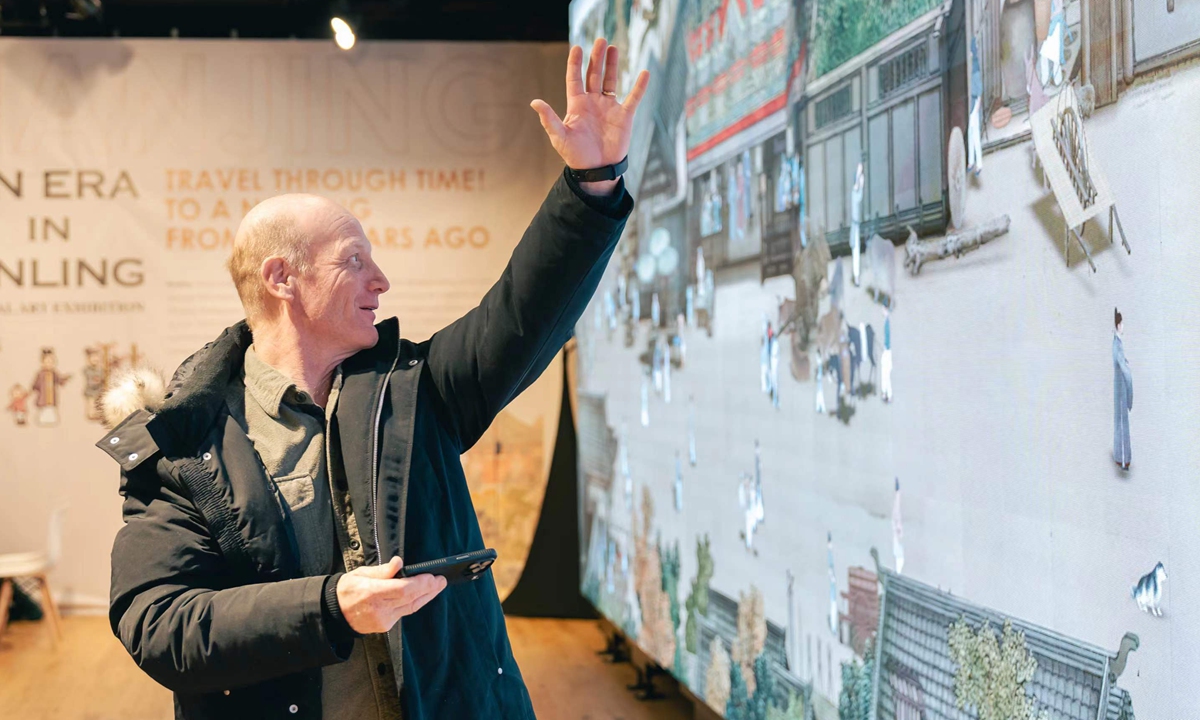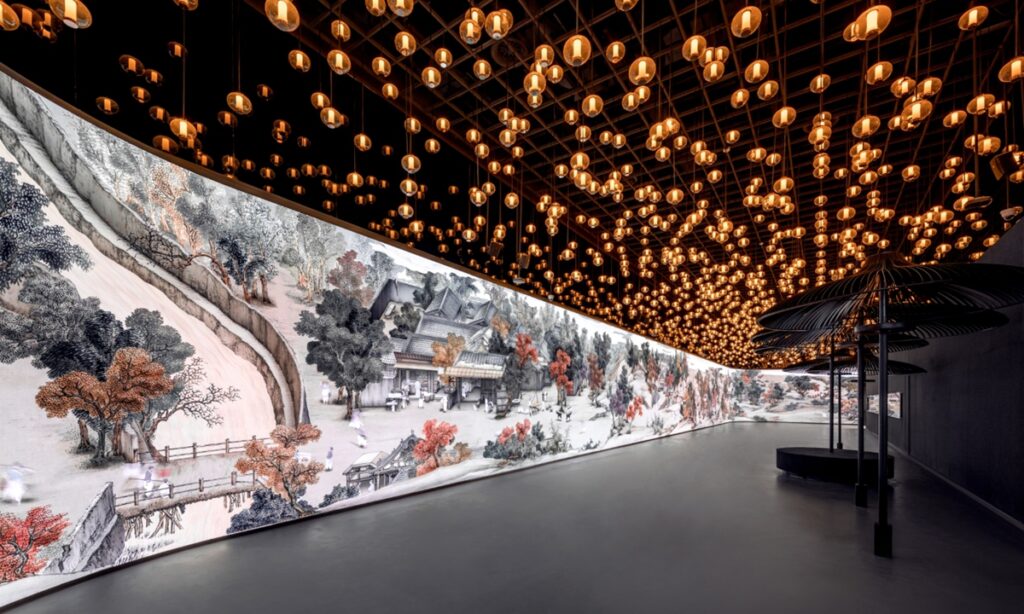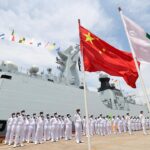Digital artwork lets visitors experience history
With a smart wristband and a mobile phone, Amaris Malfa, a young Bostonian, “walked” into the ancient Chinese painting An Era in Jinling, and even interacted with the people depicted therein.
“This is amazing! It is so vivid and vibrant, like a moving painting,” Malfa said. “I really wish my fiancé could have seen it!”
The digital artwork An Era in Jinling, which enables visitors to physically immerse themselves in the dynamic city scape of Jinling, the ancient name of Nanjing, and wander in real time through the historical city from China’s Song Dynasty (960-1279), has wowed many US visitors at the See Nanjing cultural exhibition at the Faneuil Hall Marketplace in Boston, Massachusetts.
The exhibition features Chinese garden arts and Nanjing’s intangible cultural heritage, as well as Global Smile Delivery, a display of Nanjing’s best wishes to the world that highlights the historical and modern elements of the 2,500-year-old Chinese city near the Yangtze River.
“Seeing is believing and being part of it allows the overseas audiences to have a better and deeper understanding of the cultural heritage of Jinling and what people’s lives looked like dating back 1,000 years ago,” Ai Lin, the director of the Deji Art Museum in Nanjing who has led her team to develop this digital exhibition inspired by the ancient painting of the same name, told the Global Times on Wednesday..

A visitor experiences ancient Chinese culture through the digital artwork An Era in Jinling in Boston, the US. Photo: Courtesy of Deji Art Museum
According to Ai, the handscroll, magnified and projected onto a 110-meter by 3.6-meter screen, depicts a total of 533 figures, 90 animals, and over two dozen carriages, horses and sedans. Audiences can wander the streets and interact with these figures in real time.
“The Deji Art Museum hopes to encourage visitors to explore and interact with history and art across time with the assistance of advanced technology, making each an ambassador of Chinese culture,” said Ai.
Before the US tour, Ai and her team members completed a lot of research in order to ensure every detail is close to locals’ understanding of Chinese culture.
“We managed to make it easy for them to access Chinese culture even if some of them may have little knowledge about China. We have an over 5,000-year-old culture, but how to show it and its stories to overseas audiences still remains a topic that we all need to explore,” she said.
“As a city that served as the capital of six dynasties in Chinese history, Nanjing is one of the cradles of Chinese civilization and produced a myriad of great people in history,” Chinese Consul General in New York Huang Ping said in his opening address.
“Like the Charles River in Boston, the Qinhuai River running through Nanjing has witnessed numerous major historical events.”
With this Chinese art program and “the cultural feast” at the Faneuil Hall Marketplace, “I have no doubt that the ‘Nanjing Week’ will offer audiences totally new and multiple perspectives of this wonderful part of China,” he said.
He also released a tweet to recommend the exhibition: “The digital exhibition of an ancient painting, letters and paintings drawn by animals and insects will show you a perfect combination of culture, nature and urban development.”
For Deji Art Museum, An Era in Jinling not only provides a window for the people of the US to get to know China’s cultural treasures, but also raises their interest in China and Chinese civilization. Among the figures in the painting is a waiter being called “Tea Doctor,” not because they had a doctoral degree, but because they are good at making and serving tea.
They are tea professionals from 1,000 years ago. Their amazing skills were not only popular in China, but were also introduced to other Asian countries like Japan, which was highly influenced by China’s tea culture.
“Things like that are interesting information that they want to learn and makes them want to learn more,” Ai added.
“The display and interaction of a single ancient painting is far from enough. The most important thing is to open a door for them into Chinese culture. A figure in the painting will say, ‘Hello, Boston! Welcome to Nanjing,’ inviting them to visit China to have a close look at this friendly country and people,” added Ai, who said she hopes this creative digital artwork of Deji Art Museum can tour to more places and show more people “how wonderful Chinese art is and how cool China’s technology is.”
Boston Council President Ed Flynn said that the exhibition “is serving as a remarkable symbol of cultural understanding and exchanges, fostering goodwill, and strengthening the bonds of friendship between our two cities.”
Besides this, the exhibition also features unique “Insect Poetry” and “Insect Painting,” which represent a beautiful land of dreams and harmonious coexistence between mankind and nature.
As a renowned Chinese city with a long history and rich culture, Nanjing boasts a wealth of intangible cultural heritage, including Pingtan, a form of storytelling and singing in a local dialect, and Kunqu Opera, known as a living fossil of Chinese theatrical art.
Kunqu Opera, known as a living fossil of Chinese theatrical art.
(Global Times)




